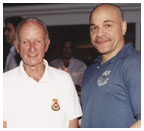|
Web Exclusives: Alumni Spotlight November 2, 2005:
The Harbor: As a teenager, Anthony Duke ’41 worked as a summer camp counselor for immigrant children in New York for several years. Convinced that fresh air mixed with discipline and mutual respect would go a long way for inner-city boys, Duke decided to start his own camp, Boys Harbor, in 1937, rounding up his prep-school and college friends to serve as counselors and mentors. Sixty-eight years later, “the Harbor” is still going strong. From the start, working with poor city kids, Duke saw beyond stereotypes. “I learned [the boys] were not at all what they were supposed to be ... wild and crazy, delinquent, into gangs,” says Duke, who still serves as the Harbor’s president and is the former vice president of an import/export company and former director of the American National Bank. “I found a lot of talent in that first group and I found a lot of talent forever after,” adds Duke. Former Harbor campers, for many of whom Duke has helped find college scholarships, have gone on to become firefighters, police officers, doctors, lawyers, professors, and nurses. What started during the Depression with about 60 kids at summer camp has grown to a year-round organization, now called Boys and Girls Harbor, based in East Harlem, and serving some 6,000 people annually. For disadvantaged children and adults in East Harlem, Harlem, and the South Bronx, the Harbor offers a host of programs, including day-care centers, a charter school for grades 1–8, a private high school, a literacy program, after-school and performing arts programs, health services, and a camp in East Hampton, N.Y. Through its programs, the Harbor aims to help inner-city youths discover their talents and reach their potential. As Duke begins to contemplate “lessening my hold” on the Harbor, he looks to Hans Hageman ’80, hired in 2002 as executive director, to steer the Harbor into the future. An East Harlem native, Hageman in 1992 founded, with his brother, a private middle school for at-risk youths in East Harlem. Four years ago, Hageman left his brother in charge and with his wife founded a school in India for poor Hindu and Muslim girls. But the pull to return to his roots and a commitment to helping urban youths in his Harlem community drew him back to the Harbor. The Harbor, says Hageman, acts as a safety net and ladder for
families in Harlem, by providing what many people in the suburbs
take for granted. The Harbor’s mission — to cultivate
productive members of society — “is not sexy,”
he says. But time and again Harbor alumni return to tell Duke what
a difference the programs made in their lives. One program alumnus,
at his investiture ceremony to become a New York State Supreme Court
judge, broke down in tears and attributed much of his success to
his years at Boys Harbor. Says Duke, “Quite a few [Harbor
alumni] tell me that. I like hearing it, but I also tell them that
all we did was find out what you were made of and help you develop
it. I don’t want to take credit for what a boy or girl already
has.” By K.F.G.
|
||

